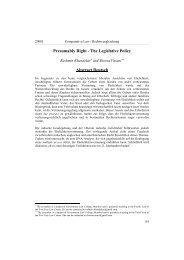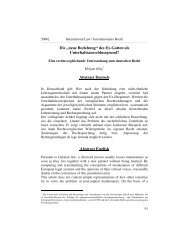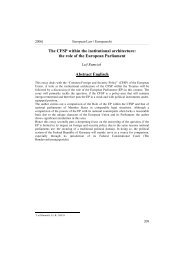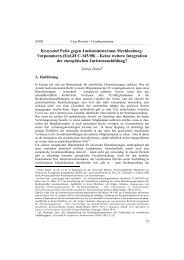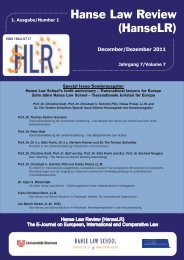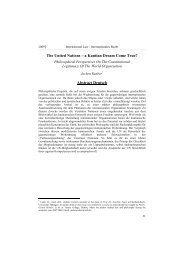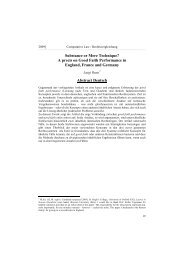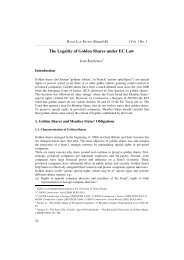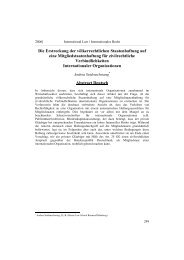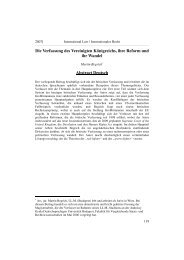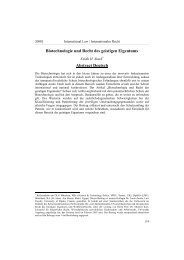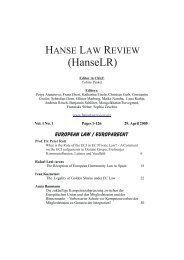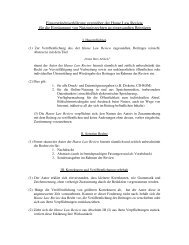The United Nations – a Kantian Dream Come True? - Hanse Law ...
The United Nations – a Kantian Dream Come True? - Hanse Law ...
The United Nations – a Kantian Dream Come True? - Hanse Law ...
Create successful ePaper yourself
Turn your PDF publications into a flip-book with our unique Google optimized e-Paper software.
2009] International <strong>Law</strong> / Internationales Recht<br />
___________________________________________________________________________________________________________________________________________________<br />
if those internal crises often also had an impact on international relations, be it because a<br />
possible interference by third parties was to be expected 80 or because of tremendous refugee<br />
flows. 81 Whereas in these cases the UN relied on a so-called ‘double strategy’ 82 and dealt<br />
with internal conflicts under the pretext of the prevention of regional destabilisation that<br />
could possibly result in an interstate conflict, in December 1993 the Security Council blew<br />
its cover and in Resolution 794 acknowledged that ‘the magnitude of the human tragedy<br />
caused by the conflict in Somalia [...] constitutes a threat to international peace and<br />
security’. 83 Neither in the debates preparing this resolution nor in the text of the resolution<br />
itself reference to international consequences or the conflict’s effect on regional stability<br />
was made, peace was considered to be threatened by the internal situation as such. 84 This<br />
concept has been applied several times without the principled opposition of any member<br />
state. 85 Thus, the emphasis within the UN notion of peace shifts away from the requirement<br />
of internationality towards a concept including the absence of human suffering from the use<br />
of force in inter- and intra-state relations <strong>–</strong> contrary to the strict wording of the Charter,<br />
contrary to Kant’s philosophical argument. <strong>The</strong>reby the UN clearly deviates from its<br />
philosophical groundwork. With regard to Perpetual Peace, peace is inter-state peace. 86<br />
c) Global Peace - a Positive Concept?<br />
In the academic divide between positive and negative notions of peace the <strong>Kantian</strong> proposal<br />
clearly favours the former. 87 It doesn’t confine itself to the elimination of military force in<br />
international relations, as a conception based on a negative concept of peace would.<br />
Although terms like ‘putting “an end to all hostilities”’ 88 and ‘seeking the absence of “all<br />
[...] reasons for a future war”’ 89 appear to imply that the absence of war (understood as an<br />
armed conflict) satisfies <strong>Kantian</strong> criteria, Kant applies a broad notion of war, that is not<br />
limited to military strife but distinguishes between two different kinds of violations of right:<br />
active injuries (laesio), a ‘legal civil state’ provided, and injuries per statum in the state of<br />
nature. 90 For Kant even these injuries per statum constitute a state of war, a lawless state of<br />
80 Frowein and Krisch, n. 18 consider the UN intervention in the Yugoslav War in 1991 to be such a case, see SC<br />
Res. 713 of September 25, 1991.<br />
81 This was the case in 1991 when the UN took measures to protect the Kurdish population in Northern Iraq, see<br />
SC Res. 688 of April 5, 1991.<br />
82 De Wet, Erika, <strong>The</strong> Chapter VII Powers of the <strong>United</strong> <strong>Nations</strong> Security Council (Hart Publishing, Oxford, 2004),<br />
150 ff.<br />
83 SC Res. 794 of 3 December 1992.<br />
84 Frowein and Krisch, n. 18; De Wet, 156 f.<br />
85 See, e.g., SC Res. 929 of June 22, 1994 (on Rwanda) and SC Res. 1078 of November 9, 1996 (on Zaire); further<br />
SC Res. 1296 of April 19, 2000; SC Res. 1314 of August 11, 2000.<br />
86 If this deviation can in cases of humanitarian interventions nonetheless be justified applying <strong>Kantian</strong><br />
assumptions is currently discussed between Kant scholars, see, e.g. Cavallar, Kant and International Right, 81-93;<br />
Cavallar, Georg and Reinisch, August, ‘Kant, Intervention and the Failed State’, in Byrd, S. and Hruschka, J.<br />
(eds), Kant and <strong>Law</strong> (Ashgate, Aldershot, 2006), 431; Habermas, ‘Kant's Idea of Perpetual Peace With the Benefit<br />
of Two Hundred Years' Hindsight’, 127-134; Habermas, Jürgen, ‘Bestialität und Humanität’, Die Zeit No. 18/1999<br />
(April 29, 1999), 1; Jaberg, Sabine, Kants Friedensschrift und die Idee kollektiver Sicherheit <strong>–</strong> Eine<br />
Rechtfertigungsgrundlage für den Kosovo-Krieg der Nato? (IFSH, Hamburg, 2002), 42 ff., Lange-Bertalot, passim<br />
and Tesón, Fernando R. ‘<strong>The</strong> <strong>Kantian</strong> <strong>The</strong>ory of International <strong>Law</strong>’, [1992] 92 Columbia <strong>Law</strong> Review 53, 74-84<br />
and passim; for a critical review of the latter’s position see Capps, passim.<br />
87 Lutz-Bachmann, 61 f.<br />
88 Kant, ‘Perpetual Peace’, 93.<br />
89 Ibid.<br />
90 See Cavallar, Kant and International Right, 53.<br />
59



